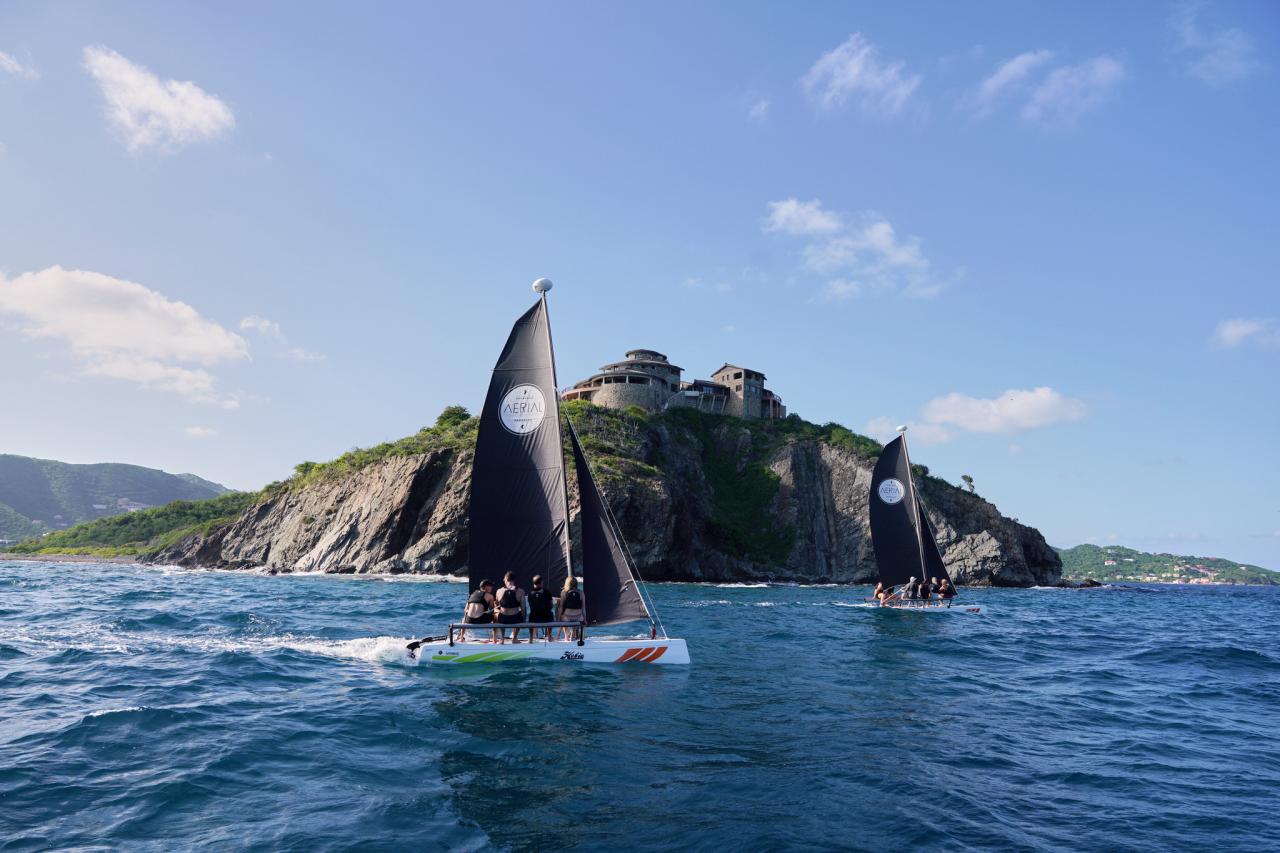Sustainable tourism initiatives and eco-friendly resorts in the British Virgin Islands
Sustainable tourism initiatives and eco-friendly resorts in the British Virgin Islands represent a crucial intersection of environmental preservation and economic growth. The delicate ecosystem of the British Virgin Islands, renowned for its pristine beaches and vibrant coral reefs, is increasingly vulnerable to the pressures of tourism. This exploration delves into the innovative strategies being implemented to balance the allure of these islands with the urgent need for responsible environmental stewardship, examining the roles of resorts, communities, and government in shaping a sustainable future for this Caribbean paradise.
This examination will analyze the challenges faced, the successes achieved, and the potential for future development. We will explore specific examples of eco-conscious resorts, community-driven initiatives, and governmental policies aimed at mitigating the environmental impact of tourism while fostering economic prosperity for the local population. The aim is to provide a comprehensive overview of the ongoing efforts to ensure the long-term sustainability of tourism in the British Virgin Islands.
Defining Sustainable Tourism in the British Virgin Islands
Sustainable tourism in the British Virgin Islands (BVI) necessitates a delicate balance between economic growth, environmental protection, and social equity. The archipelago’s unique beauty and biodiversity are its primary economic drivers, making the preservation of these assets paramount for long-term prosperity. Sustainable practices aim to minimize the negative impacts of tourism while maximizing its positive contributions to the BVI’s communities and ecosystems.The BVI’s fragile environment faces several significant challenges related to tourism.
These include the pressure on limited freshwater resources from increased visitor numbers, the risk of coastal erosion and habitat destruction due to development, the pollution from boat traffic and waste disposal, and the vulnerability of coral reefs to damage from anchors, sunscreen chemicals, and rising sea temperatures exacerbated by climate change. Balancing the needs of a thriving tourism sector with the imperative to protect these irreplaceable natural resources is a key challenge for the BVI.
Principles of Sustainable Tourism in the BVI
The principles of sustainable tourism in the BVI are rooted in minimizing environmental impact, respecting local culture and communities, and ensuring economic viability. This involves responsible resource management, waste reduction and recycling programs, conservation efforts to protect biodiversity (including coral reefs and marine life), and the promotion of locally owned businesses and employment opportunities. Furthermore, sustainable tourism actively involves local communities in decision-making processes and ensures that tourism benefits are equitably distributed.
A strong focus on education and awareness-raising among both tourists and locals is crucial to fostering a culture of sustainability.
Unsustainable Tourism Practices in the BVI
Several unsustainable tourism practices are prevalent in the BVI. Overdevelopment along the coastlines leads to habitat destruction and increased pollution. Improper waste disposal contributes to water and land pollution, harming marine life and impacting the quality of beaches. Unsustainable fishing practices deplete fish stocks and damage coral reefs. The use of single-use plastics remains widespread, contributing to significant plastic pollution in the marine environment.
Finally, a lack of awareness among some tourists about the environmental fragility of the islands contributes to unsustainable behaviors.
Economic Benefits of Sustainable Tourism in the BVI
Adopting sustainable tourism practices offers significant economic benefits to the BVI. By protecting the natural environment, the islands maintain their attractiveness to tourists, ensuring the long-term viability of the tourism sector. Investing in renewable energy sources and improving waste management can reduce operational costs for businesses. Supporting local businesses and employing local residents creates jobs and stimulates the local economy.
Furthermore, a strong reputation for sustainability can attract high-spending, environmentally conscious tourists willing to pay a premium for eco-friendly experiences, leading to increased revenue. The long-term economic stability of the BVI is intrinsically linked to the health of its environment, making sustainable tourism a crucial investment in the future.
The British Virgin Islands are increasingly focusing on sustainable tourism initiatives, with eco-friendly resorts leading the charge. Many offer unique experiences focusing on the natural beauty of the islands, but for those seeking a luxurious arrival, consider the journey itself; discovering what are the best amenities on luxury flights what are the best amenities on luxury flights can enhance the overall experience before you even reach your eco-conscious resort.
Ultimately, a commitment to sustainable travel should encompass the entire journey, from flight to final destination.
Eco-Friendly Resort Practices in the British Virgin Islands
The British Virgin Islands (BVI), renowned for their pristine natural beauty, are increasingly embracing sustainable tourism practices. Many resorts are actively implementing eco-friendly initiatives to minimize their environmental footprint while contributing to the local economy. This section will explore some examples of these practices and consider the potential for future development in this area.
Examples of Eco-Friendly Resorts in the BVI and Their Initiatives
Several resorts in the BVI are leading the way in sustainable tourism. The following table highlights specific initiatives undertaken by three such resorts, showcasing their commitment to environmental and economic sustainability. Note that the information provided represents a snapshot in time and specific initiatives may evolve.
| Resort Name | Specific Initiative | Environmental Impact | Economic Impact |
|---|---|---|---|
(Resort Name 1 –
|
(Specific initiative, e.g., Implementation of a comprehensive waste management program including composting and recycling.) | (e.g., Reduction in landfill waste, decreased reliance on single-use plastics, improved soil health through composting.) | (e.g., Creation of local jobs in waste management, potential cost savings through reduced waste disposal fees.) |
(Resort Name 2 –
|
(Specific initiative, e.g., Use of solar panels to power resort facilities.) | (e.g., Reduced reliance on fossil fuels, decreased carbon emissions, conservation of natural resources.) | (e.g., Potential cost savings on electricity bills, positive public relations enhancing brand image.) |
(Resort Name 3 –
|
(Specific initiative, e.g., Coral reef restoration project in partnership with local community.) | (e.g., Improved coral reef health, increased biodiversity, protection of coastal ecosystems.) | (e.g., Job creation in the local community, positive contribution to local environmental awareness, potential increase in tourism due to enhanced ecosystem health.) |
Comparison of Sustainability Strategies Across BVI Resorts
While the specific initiatives vary across resorts, several common themes emerge. Many focus on waste reduction and management, energy efficiency, and water conservation. However, the scale and scope of these initiatives differ, depending on the size and resources of the resort. Some resorts may prioritize community engagement and partnerships, while others concentrate on technological solutions.
A key difference lies in the level of transparency and reporting on sustainability performance. Some resorts proactively communicate their efforts to guests and stakeholders, while others may have less robust reporting mechanisms.
Renewable Energy Sources in BVI Resorts
The BVI’s abundant sunshine makes solar power a particularly attractive renewable energy source for resorts. Several resorts are already incorporating solar panels into their energy infrastructure, reducing their reliance on fossil fuels and lowering their carbon footprint. While wind power is less prevalent due to geographical limitations, some resorts may explore hybrid systems combining solar and wind energy to maximize renewable energy generation.
The adoption of renewable energy is not only environmentally beneficial but also contributes to energy independence and cost savings for resorts in the long run. Further research into the feasibility of wave energy and other renewable options could offer additional avenues for sustainable energy generation.
Hypothetical Eco-Friendly Resort Concept for the BVI
A hypothetical eco-resort in the BVI could incorporate several cutting-edge sustainable features. It could be designed with passive solar design principles to minimize energy consumption, utilizing natural ventilation and shading to regulate temperature. Greywater recycling systems could be implemented to conserve water, and rainwater harvesting could supplement freshwater supplies. The resort could also feature a thriving organic garden providing fresh produce for the restaurant, reducing reliance on imported food.
Furthermore, it could partner with local communities on waste management initiatives and offer educational programs to raise awareness about sustainable tourism practices. Such a resort would not only minimize its environmental impact but also contribute significantly to the local economy and enhance the overall visitor experience.
Community Engagement and Sustainable Tourism

Source: aerialbvi.com
The success of sustainable tourism in the British Virgin Islands (BVI) hinges critically on the active participation and empowerment of local communities. Their intimate knowledge of the environment, culture, and traditions is invaluable in shaping tourism initiatives that are both economically viable and environmentally responsible. Genuine community engagement fosters a sense of ownership and pride, leading to long-term sustainability and mutual benefit.The involvement of local communities ensures that tourism development aligns with the needs and aspirations of the residents, preventing the potential negative impacts often associated with uncontrolled tourism growth.
It fosters a collaborative environment where stakeholders work together to create a tourism model that respects the delicate balance between economic progress and environmental protection.
Successful Community-Based Tourism Initiatives in the BVI, Sustainable tourism initiatives and eco-friendly resorts in the British Virgin Islands
Several community-based tourism initiatives in the BVI demonstrate the power of local engagement. For example, some communities have established locally owned and operated tour businesses, showcasing their unique cultural heritage and natural attractions. These businesses often prioritize environmentally friendly practices and reinvest profits back into the community, creating a positive feedback loop. Another example is the involvement of local artisans and farmers in supplying goods and services to eco-lodges and resorts, strengthening local economies and preserving traditional skills.
These initiatives not only provide economic opportunities but also preserve and promote the unique cultural identity of the BVI.
Economic and Cultural Benefits of Sustainable Tourism for Local Communities
Sustainable tourism provides numerous economic benefits to local communities in the BVI. Increased employment opportunities in various sectors, from hospitality and transportation to guiding and artisan crafts, directly boost household incomes. Furthermore, the development of eco-friendly businesses fosters economic diversification, reducing reliance on traditional industries and enhancing resilience to external shocks. Beyond economic gains, sustainable tourism strengthens cultural preservation.
By actively involving communities in tourism development, traditional practices, storytelling, and artistic expressions are preserved and promoted, fostering a stronger sense of cultural identity and pride. The influx of tourists provides a platform for showcasing local culture, generating both economic benefits and cultural awareness.
The British Virgin Islands are increasingly focusing on sustainable tourism initiatives, with eco-friendly resorts popping up across the archipelago. Planning your trip involves considering not only the idyllic destinations but also the journey itself; for a comfortable flight, you might research options like those offered by top luxury airlines with best in-flight entertainment , ensuring a relaxing start to your sustainable vacation.
Once you arrive, you’ll find many resorts committed to minimizing their environmental impact, allowing you to enjoy the islands’ beauty responsibly.
Strategies for Engaging Local Communities in Sustainable Tourism
Effective community engagement requires a multi-faceted approach. A crucial initial step is establishing open and transparent communication channels. Regular community meetings and forums provide platforms for dialogue, allowing locals to voice their concerns, share their knowledge, and actively participate in decision-making processes. Secondly, prioritizing local employment and business opportunities is essential. This can be achieved through capacity-building programs that equip community members with the skills and knowledge needed to participate in the tourism sector.
Furthermore, ensuring that the benefits of tourism are equitably distributed across the community is vital. This requires careful planning and management of tourism revenues, ensuring that a significant portion is reinvested in community development projects, such as infrastructure improvements, education initiatives, and environmental conservation programs. Finally, actively involving local communities in environmental conservation efforts fosters a shared responsibility for protecting the natural resources upon which tourism depends.
This could involve community-led initiatives for waste management, reef protection, and sustainable agriculture.
Environmental Protection and Conservation Efforts
The British Virgin Islands (BVI) boasts exceptional natural beauty, a significant draw for its thriving tourism sector. However, this very beauty is vulnerable to the pressures of increased visitor numbers. Protecting the environment is paramount not only for preserving the islands’ unique ecosystem but also for ensuring the long-term sustainability of the tourism industry itself. A delicate balance must be struck between economic development and environmental stewardship.The impact of tourism on the BVI’s environment is multifaceted and requires careful consideration.
Unsustainable practices can lead to significant degradation of the natural resources that underpin the tourism industry’s success.
Sustainable tourism initiatives are flourishing in the British Virgin Islands, with eco-friendly resorts leading the way. Planning your trip to these beautiful islands requires careful budgeting, however, so it’s wise to be aware of potential pitfalls like the hidden fees and extra charges on luxury flights, as detailed in this helpful guide: hidden fees and extra charges on luxury flights to avoid.
By avoiding these unexpected costs, you can maximize your budget for enjoying the sustainable tourism offerings and the stunning natural beauty of the BVI.
Key Environmental Areas Needing Protection in the BVI
The BVI’s diverse ecosystems, crucial for both biodiversity and tourism, face numerous threats. Coral reefs, vital for marine life and coastal protection, are particularly vulnerable. Mangrove forests, acting as nurseries for fish and buffers against erosion, are also at risk. The pristine beaches and coastal areas, highly attractive to tourists, suffer from pollution and habitat destruction. Protecting these key areas requires a multi-pronged approach encompassing legislation, education, and community involvement.
The unique biodiversity found within the BVI’s protected areas, such as Virgin Gorda’s Baths and the various national parks, requires careful management to maintain their ecological integrity. The preservation of these areas is not only important for environmental reasons, but also for their significant contribution to the BVI’s economy.
Impact of Tourism on Coral Reefs, Marine Life, and Coastal Ecosystems
Tourism’s impact on the BVI’s marine environment is significant. Boat anchors can damage coral reefs, while careless snorkeling and diving practices can cause physical damage and sedimentation. Increased human activity leads to water pollution from sunscreen chemicals, sewage, and litter, harming coral health and marine life. Coastal development for hotels and resorts can lead to habitat loss and erosion, impacting nesting sites for sea turtles and other wildlife.
Overfishing to meet the demands of tourist restaurants can deplete fish stocks and disrupt the marine ecosystem. The cumulative effect of these impacts can lead to coral bleaching, biodiversity loss, and the degradation of coastal ecosystems, ultimately threatening the very foundation of the tourism industry. For example, the decline in coral health directly impacts the appeal of snorkeling and diving, major tourist attractions.
Examples of Conservation Programs in the BVI
Several initiatives are underway to address these environmental challenges. The BVI Tourist Board actively promotes responsible tourism practices, encouraging visitors to minimize their environmental impact. Non-governmental organizations (NGOs) such as the BVI National Parks Trust are actively involved in marine conservation projects, including coral reef monitoring and restoration. Community-based initiatives focus on beach cleanups and raising awareness about sustainable practices.
The BVI government has implemented regulations to control coastal development and protect marine resources. For example, mooring buoy systems are being installed to reduce anchor damage to coral reefs, and stricter regulations on waste disposal are being enforced. These programs, while valuable, require ongoing support and increased funding to achieve their full potential.
Strategies for Mitigating the Environmental Impact of Tourism
A comprehensive strategy is needed to minimize tourism’s negative environmental effects. This strategy should involve a collaborative effort among the government, tourism operators, and the local community.
- Strengthening Environmental Regulations and Enforcement: Implementing and strictly enforcing regulations on waste disposal, sewage treatment, and coastal development is crucial. This includes penalties for non-compliance to deter unsustainable practices.
- Promoting Sustainable Tourism Practices: Educating tourists and tourism operators about responsible behavior, including proper waste disposal, reef-friendly sunscreens, and avoiding disturbing marine life.
- Investing in Renewable Energy: Encouraging the adoption of renewable energy sources by hotels and resorts to reduce reliance on fossil fuels and minimize carbon emissions.
- Improving Wastewater Management: Implementing effective wastewater treatment systems to prevent pollution of coastal waters and protect marine ecosystems.
- Protecting and Restoring Coral Reefs and Mangroves: Investing in coral reef restoration projects and mangrove protection programs to enhance their resilience and biodiversity.
- Sustainable Waste Management: Implementing comprehensive waste management strategies, including recycling programs and reduction of single-use plastics, to minimize waste going to landfills and oceans.
- Community-Based Conservation Initiatives: Supporting and empowering local communities to actively participate in conservation efforts through education, training, and providing resources.
- Monitoring and Evaluation: Regularly monitoring the environmental impact of tourism through scientific studies and data collection to track progress and inform management decisions.
Government Policies and Regulations
The British Virgin Islands (BVI) government recognizes the crucial role of sustainable tourism in its economic prosperity and environmental preservation. Several policies and regulations aim to balance economic growth with ecological protection and community well-being. However, the effectiveness of these measures varies, presenting opportunities for improvement and enhanced implementation.The BVI’s approach to sustainable tourism is multifaceted, encompassing planning regulations, environmental protection laws, and initiatives promoting responsible tourism practices.
These regulations are often integrated with broader environmental policies, reflecting a holistic approach to resource management. However, the degree of enforcement and the integration of these policies across various government departments remain areas for potential improvement.
The British Virgin Islands are increasingly focused on sustainable tourism initiatives, with several eco-friendly resorts leading the way. Consider this when planning your trip; the overall cost, including your travel, is a factor. Before booking, you might want to check out this article on whether is it worth it to pay for a luxury flight experience , as it can significantly impact your budget for responsible and luxurious travel in the islands.
Ultimately, responsible travel choices contribute to preserving the BVI’s natural beauty for future generations.
Existing Policies and Regulations
The BVI government employs a range of instruments to promote sustainable tourism. These include planning regulations that control development in environmentally sensitive areas, such as coastal zones and national parks. Environmental impact assessments are often required for significant tourism projects to assess their potential ecological consequences before approval. Furthermore, waste management regulations aim to minimize the environmental footprint of tourism activities, encouraging recycling and responsible waste disposal.
Legislation related to marine protection aims to safeguard coral reefs and other sensitive marine ecosystems from damage caused by tourism. Specific regulations exist for boat operations, anchoring, and other activities that may impact the marine environment.
Effectiveness of Current Policies and Regulations
While the BVI has established a framework for sustainable tourism, challenges remain in terms of enforcement and comprehensive implementation. Limited resources and capacity within government agencies can hinder effective monitoring and enforcement of existing regulations. Furthermore, inconsistencies in the application of regulations across different islands or regions can create loopholes and inequalities. The effectiveness of environmental impact assessments is also dependent on the quality and thoroughness of the assessments conducted, as well as the subsequent follow-up and monitoring.
Data collection and analysis related to the impact of tourism on the environment and local communities are also crucial for informed policymaking and evaluation, but this area may require strengthening.
Proposed Improvements to Policies and Regulations
To enhance the effectiveness of sustainable tourism policies, several improvements are recommended. Strengthening enforcement mechanisms, including increased monitoring and penalties for non-compliance, is essential. Improved inter-agency coordination is necessary to ensure consistent application of regulations across all relevant departments. Investing in capacity building within government agencies will enhance their ability to effectively monitor and enforce regulations. Furthermore, enhancing public awareness and engagement through education campaigns can promote responsible tourism behavior among visitors and local communities.
The British Virgin Islands are increasingly focusing on sustainable tourism initiatives, with many eco-friendly resorts popping up. Planning a family trip to these idyllic islands requires careful consideration, including choosing the right transportation; finding information on the best luxury airlines for families traveling long distances is a great starting point. Once you arrive, you’ll find a range of sustainable options to continue your eco-conscious journey throughout your stay.
Regular review and updating of existing regulations to reflect best practices and emerging challenges in sustainable tourism are also vital. A stronger emphasis on data-driven decision-making, through improved data collection and analysis, will allow for more effective policy design and implementation.
The British Virgin Islands offer a range of sustainable tourism initiatives, from eco-friendly resorts committed to minimizing their environmental impact to community-based conservation projects. For those seeking a truly luxurious and efficient journey to these idyllic islands, consider reviewing this helpful resource: ultimate guide to booking a private jet for luxury travel. Ultimately, responsible travel ensures the preservation of the BVI’s natural beauty for generations to come.
Incentivizing Eco-Friendly Practices
Effective government regulations can incentivize eco-friendly practices through various mechanisms. Tax incentives or rebates for businesses adopting sustainable practices can encourage investment in eco-friendly technologies and operations. Preferential access to permits or licenses for businesses demonstrating strong commitment to sustainability can create a competitive advantage. Government procurement policies prioritizing eco-friendly products and services can create a market demand for sustainable tourism offerings.
Public recognition and awards for businesses demonstrating outstanding sustainable practices can enhance their reputation and attract environmentally conscious tourists. These incentives can create a positive feedback loop, fostering a more sustainable and responsible tourism sector.
Future of Sustainable Tourism in the British Virgin Islands: Sustainable Tourism Initiatives And Eco-friendly Resorts In The British Virgin Islands
The British Virgin Islands (BVI) stand at a crucial juncture, poised to leverage its natural beauty and unique culture to build a thriving and sustainable tourism sector. The future hinges on a continued commitment to environmentally responsible practices, community engagement, and strategic policy implementation. Success will depend on navigating potential challenges while capitalizing on emerging opportunities.
Predictions for the Future of Sustainable Tourism in the BVI
The future of sustainable tourism in the BVI points towards a significant increase in eco-conscious travelers seeking authentic experiences. We predict a rise in demand for smaller, locally-owned accommodations that prioritize environmental sustainability and cultural preservation. This shift will be driven by a growing global awareness of climate change and a desire to support responsible travel. Furthermore, technological advancements, such as improved waste management systems and renewable energy infrastructure, will play a crucial role in enhancing sustainability efforts.
We anticipate a growing emphasis on marine conservation initiatives, attracting divers and snorkelers interested in exploring healthy coral reefs and diverse marine life. This model is similar to Costa Rica’s success in ecotourism, which has demonstrably boosted both its economy and its environmental protection efforts.
Potential Challenges and Opportunities for the Growth of Sustainable Tourism in the BVI
The BVI faces challenges in balancing economic growth with environmental protection. Maintaining the delicate ecosystem while accommodating increasing tourist numbers requires careful planning and robust regulatory frameworks. The limited land area and freshwater resources necessitate efficient resource management. Another challenge lies in ensuring equitable distribution of economic benefits among local communities. However, opportunities exist in developing niche tourism products focusing on sustainable activities such as sailing, diving, hiking, and cultural immersion experiences.
Investing in renewable energy sources and sustainable infrastructure can attract environmentally conscious tourists and reduce the BVI’s carbon footprint. Partnerships with international organizations and funding agencies can provide support for implementing sustainable tourism strategies. Furthermore, leveraging digital platforms to promote sustainable tourism practices and attract responsible travelers can significantly enhance the BVI’s position in the global market.
A Visual Representation of a Sustainable Tourism Future for the BVI
Imagine a vibrant image: The turquoise waters of the BVI shimmer under a clear sky. A sleek, solar-powered catamaran glides silently across the ocean, its passengers snorkeling amongst healthy coral reefs teeming with colorful fish. On a nearby shore, a small, eco-friendly resort nestled amongst lush, native vegetation uses locally-sourced materials. The resort’s architecture seamlessly blends with the natural landscape.
Local artisans display their crafts in a nearby village, sharing their culture with visitors. Electric vehicles silently transport tourists around the islands, while efficient waste management systems ensure minimal environmental impact. The overall scene is one of harmony between nature, culture, and tourism, reflecting a thriving and sustainable ecosystem.
Long-Term Economic and Environmental Benefits of Prioritizing Sustainable Tourism in the BVI
Prioritizing sustainable tourism in the BVI offers significant long-term economic and environmental advantages. Eco-tourism generates higher revenue per tourist, as visitors are willing to pay more for authentic, sustainable experiences. This translates into increased income for local communities and businesses. Furthermore, protecting the BVI’s natural environment ensures the long-term viability of the tourism sector. Healthy coral reefs and pristine beaches attract tourists, contributing to economic prosperity.
Sustainable practices minimize environmental damage, preserving the islands’ unique biodiversity and natural beauty for future generations. This approach ensures the BVI remains a desirable destination, avoiding the negative impacts of over-tourism seen in other locations. The economic benefits are not only financial; they include job creation in the green sector, improved infrastructure, and a higher quality of life for residents.
Epilogue
The British Virgin Islands stand at a pivotal moment, balancing the economic benefits of tourism with the imperative to protect its unparalleled natural beauty. The journey towards sustainable tourism is not without its challenges, but the innovative initiatives highlighted—from eco-friendly resorts to community-based conservation efforts and progressive government policies—demonstrate a strong commitment to responsible development. By embracing a holistic approach that integrates environmental protection, economic growth, and cultural preservation, the British Virgin Islands can secure a thriving future where both its people and its environment prosper.
FAQ Explained
What are the main environmental threats to tourism in the British Virgin Islands?
Coral reef degradation, coastal erosion, pollution from waste and sewage, and disruption of marine ecosystems are major concerns.
Are there any certifications or standards for eco-friendly resorts in the BVI?
While specific BVI certifications may be limited, many resorts align with international sustainability standards like LEED or Green Globe, demonstrating their commitment to responsible practices.
How can tourists contribute to sustainable tourism in the BVI?
Tourists can support local businesses, minimize waste, respect wildlife and natural habitats, choose eco-friendly accommodations, and participate in responsible activities.
What is the role of the BVI government in promoting sustainable tourism?
The BVI government plays a crucial role through policy development, environmental regulations, enforcement, and collaboration with stakeholders to promote sustainable tourism practices.
What are some examples of community-based tourism initiatives in the BVI?
Examples could include community-owned and operated tour businesses, eco-lodges managed by local communities, and initiatives that directly involve local residents in tourism activities, preserving cultural heritage.







